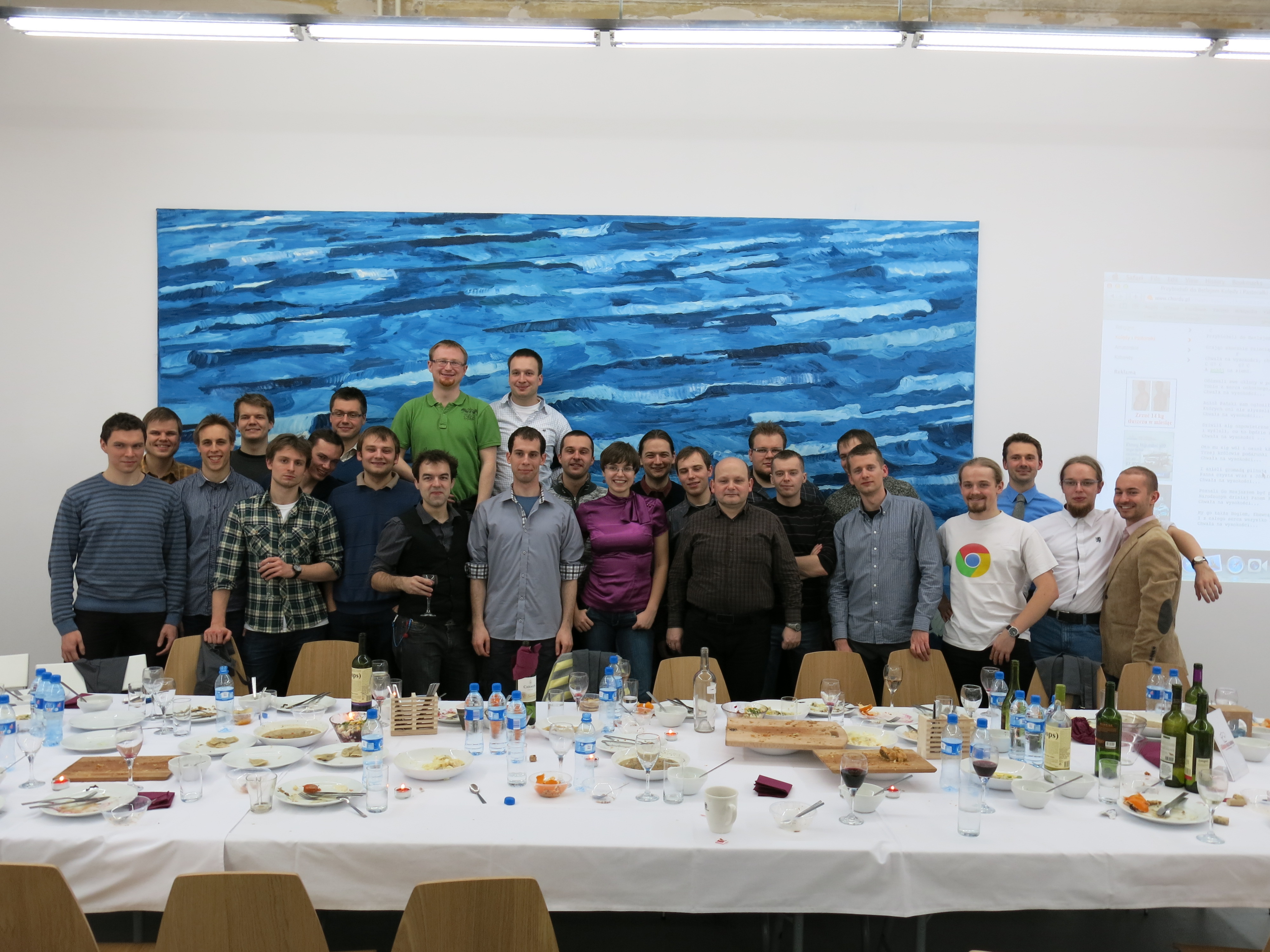Testing Android apps
with (Robo)Spock
by Wojtek Erbetowski
And who are you?
Android developers,
Spock/Groovy users,
Lost,
Other.
About me
Wojtek Erbetowski
http://erbetowski.pl
@wojtassj
Team

tech lead @ Polidea
Community
Warsaw JUG co-leader
Warsjawa 2012
Warsaw CodeRetreat 2013
NameCollision hackathon 2013
Git kata 2013
MobileWarsaw (coming, April, 22nd)
Warsaw CodeRetreat 2013
NameCollision hackathon 2013
Git kata 2013
MobileWarsaw (coming, April, 22nd)
Goals
- Build theoretical background for Android Unit Testing
- Discuss difficulties of running Android unit tests
- Present Spock and Robolectric to Android devs
Testing Android
Fundamentals
Project Structure
MyProject/
AndroidManifest.xml
res/
... (resources for main application)
src/
... (source code for main application) ...
tests/
AndroidManifest.xml
res/
... (resources for tests)
src/
... (source code for tests)Life cycle
- Edit the code
- Redeploy applications to emulator
- Launch tests
Potential problems
- Continuous Integration
-
Parallelization
- Slow
- Java!
Sample test
public class ScanExampleTest
extends ActivityInstrumentationTestCase2<MyScanActivity> {
private Solo solo;
public ScanExampleTest() {
super("org.my.scanExample", MyScanActivity.class);
}
@Override
public void setUp() throws Exception {
solo = new Solo(getInstrumentation(), getActivity());
}
public void testManualEntry() throws Exception {
solo.assertCurrentActivity("expecting example app", MyScanActivity.class);
boolean ableToScan = CardIOActivity.canReadCardWithCamera(solo.getCurrentActivity());
solo.clickOnButton(0);
if (ableToScan) {
// some devices don't support use of the camera.
solo.assertCurrentActivity("Expected CardIOActivity (scan)", "CardIOActivity");
solo.clickOnButton("Keyboard...");
}
solo.assertCurrentActivity("Expected DataEntryActivity", "DataEntryActivity");
solo.enterText(0, "4111111111111111");
solo.enterText(1, "12/22");
solo.clickOnButton("Done");
solo.assertCurrentActivity("Expected completion", MyScanActivity.class);
assertEquals("Card Number not found", true, solo.searchText("Card Number:"));
assertEquals("Expiry not found", true, solo.searchText("Expiration Date: 12/2022"));
}
}Based on https://github.com/card-io/android-scan-demoWhy not Groovy?
What do we need?
The server side
- blazing fast unit tests
- dynamic languages in tests
- dependency injection & mocking
- examples and specs instead of tests (BDD)
- integration and functional tests
Tests pyramid

Unit tests
- testing one unit at a time
- separates from the environment
- in memory database (if any)
- simple
- fast!
Lets escape from Dalvik VM!
Still JUnit?
JUnit -> Spock
Behavior Driven Development
void testAggregateSevesUser() {
// given
User user = new User();
// when
aggregate.store(user);
// then
assertEquals(
user,
aggregate.findOnly()
);
}def 'aggregate should save user'(){
given:
def user = new User()
when:
aggregate.store user
then:
aggregate.findOnly() == user
}JUnit -> Spock
Assertions
// expect
assertNotNull(title);
assertContains(title, "About");expect:
title =~ 'About'JUnit -> Spock
Parametrization
// ...
// then
assertNotNull(activity.getState());
assertNotNull(activity.getStatus());
assertNotNull(activity.getIcon());
assertNotNull(
activity.getEverythingElse()
);
// ...
expect:
activity."$field" != null
where:
field << [
"state", "status",
"icon", "everythingElse"
]
JUnit -> Spock
Mocks
// given
User userMock = mock(User.class);
when(userMock.getEmail())
.thenReturn("email@email.com")
.thenReturn(null);
// ...
// then
verify(userMock, times(2)).getEmail()given:
def userMock = Mock(User)
userMock.getEmail() >> [
'email@email.com', null
]
// ...
then:
2 * userMock.getEmail()JUnit -> Spock
Exception handling - simple
@Test(expect=RuntimeException.class)
public void myTest() {
thisThrowsSomething();
}when:
thisThrowsSomething()
then:
thrown(RuntimeException)JUnit -> Spock
Exception handling - detailed
@Test
public void myTest() {
try {
thisThrowsSomething();
fail();
} catch(RuntimeException e) {
assertContains(
e.getMessage(), 'No such user')
}
}when:
thisThrowsSomething()
then:
def e = thrown(RuntimeException)
e.message =~ 'No such user'
JUnit -> Spock
Groovy
then:
userStorage.getAllUsers().find{it.id == id}?.name == "Szymon"
Condition not satisfied:
userRepository.findAll().find{it.name == 'Szymon'}?.age == 10
| | | | |
| | null | false
| [A$User(Piotr, 12)] null
A$UserRepository@22d3d11f
<Click to see difference>
So what's the problem, anyway?
A close look into android.jar
It's a mock!
Wasn't it open source?
-
native code
- not exactly Java
- not as portable
- IDE support
One the other hand - the code is mostly simple
Robolectric
The story about Robots, Classloaders and Stubs
Classloaders
Switch class definition
Implementing classes
in Robolectric
Requirements
vel how to play with it
@RunWith(RobolectricTestRunner.class)
public class MyActivityTest {
// ..
}Do we need test runner?
public class MyTest {
public void test() {
Activity x = // Activity on the left loaded on MyTest bootstrap
getMyActivity(); // but the method returned shadowed activity
}
}java.lang.ClassCastException: android.app.Activity
cannot be cast to android.app.Activity
Meet RoboSpock
class MyActivitySpec extends RoboSpecification {...}
Using both
Robolectric
- classloader
- shadows
- DB support
Spockframework
- runner
- extension points
- everything else
Thank you Open Source!
Robolectric
The MIT License
Developed by (mostly) PivotalLabs
https://github.com/pivotal/robolectric
Thank you Open Source!
Spockframework
Apache 2.0
Developed (mostly) by Peter Niederwieser
https://code.google.com/p/spock/
RoboSpock examples
ORMLite
def "should throw SQL Constraint exception on existing primary key"() {
given:
def dao = databaseHelper.getDao(DatabaseObject)
and: 'stored object'
def dbObject = new DatabaseObject("test", 4, 1)
dao.create(dbObject)
when: 'duplication'
dao.create(dbObject)
then:
def exception = thrown(RuntimeException)
exception.message =~ "SQLITE_CONSTRAINT"
exception.cause.class == SQLException
}RoboGuice
class TaskActivityTestGroovy extends RoboSpecification {
@Inject WebInterface webInterface
def setup() {
inject {
install(TestTaskExecutorModule)
bind(WebInterface).toInstance(Mock(WebInterface))
}
}
def "should load text from async task"() {
given:
def taskActivity = new TaskActivity()
when:
taskActivity.onCreate(null)
then:
taskActivity.asyncText.text == "WebText"
}
}Custom shadows
@UseShadows(MyActivityManagerShadow)
class TaskActivityTestGroovy extends RoboSpecification {
def "should load text from async task"() {
given:
def taskActivity = new TaskActivity()
when:
taskActivity.onCreate(null)
then:
taskActivity.asyncText.text == "WebText"
}
}Why is it all so important?
Mastering TDD is hard enough
We need stable, functional and powerful tools
to focus on important part - the logic
Roadmap
State of the art
Robolectric 1.2 support
Guice support
Custom shadows
Plans
Updating to robolectric 2.0 (after release)
Tutorial, docs, ...